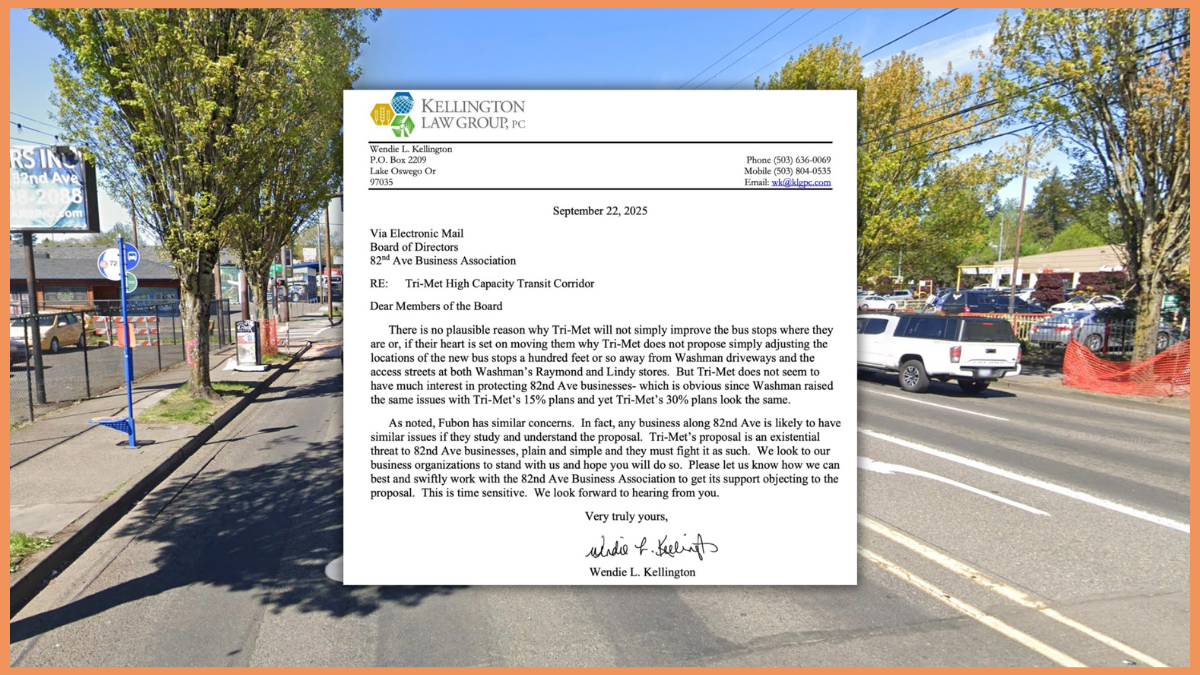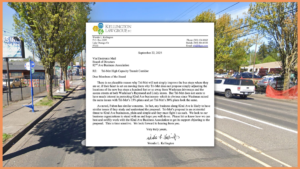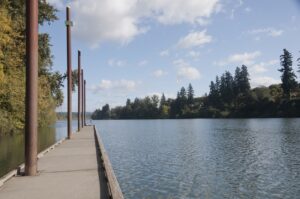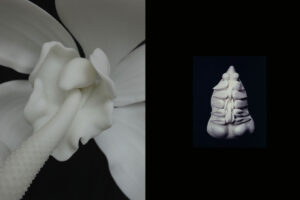With New HQ, Literary Arts (Finally) Finds a Permanent Physical Form

A bookstore, bar and café, and events space will take up most of the ground floor at Literary Arts’ new headquarters, seen here as a prospective rendering.
Five-thousand attendees flock to the South Park Blocks every fall, catching a handful of the Portland Book Festival’s 100 presenting authors. Bookish Portlanders fill the Schnitz five times each year, welcoming the likes of Zadie Smith and Patrick Radden Keefe for the Portland Arts and Lectures series. But perhaps the furthest reach of Literary Arts, the local nonprofit behind both events (and countless others), comes from its Writers in the Schools program, which pairs working writers with public school teachers to give students direct contact with authors.
The organization is unquestionably the heart of the region’s literary scene, but for the past 40 years it has operated behind the scenes within a downtown shoebox office. Soon, however, Literary Arts will have a sprawling new Buckman home, featuring a 2,000-square-foot bookstore and a café and bar.
“Four times the size,” executive director Andrew Proctor said during a walk-through in June, his voice bouncing proudly around the high-ceilinged construction site of the organization’s new space, slated to open in October. “Imagine events, classes, workshops, plus all the patronage of a bookstore.”

After years of planning and construction, the space plans to open this October.
The bookshop fills most of the ground floor, housing rows of shelves that roll away to transform the room into a 75-seat event space. Floor-to-ceiling windows line the wall and entryway. An open staircase leads to the bookstore’s mezzanine level, where Proctor imagines visitors will watch readings, beer in hand. Four classrooms throughout the building will host smaller groups, and a basement studio will house The Archive Project, the radio show and podcast Literary Arts produces with OPB.
The headquarters, on SE Grand Avenue between Alder and Morrison, will be the largest space of its kind on the West Coast, Proctor says—something with the communal energy and national pull of Powell’s and many of the public resources of a medium-sized library. He calls it a “radical change for the organization that is long overdue.”
A board of directors that includes former county commissioner Susheela Jayapal and graphic novelist Jonathan Hill illustrates Literary Arts’ deep community ties. Amy Donohue, a principal at Bora Architects—the locally based firm behind the proposal to build an alternative to the Keller Auditorium on Portland State University’s campus—is its chair, as well as the architect of record on this project.
“We’re giving the building another 100 years of life—full seismic upgrade,” Donohue says, pointing out the network of steel beams reinforcing the still-intact brick laid in 1904. Visible ductwork and masonry left over from its first life as Strowbridge Hardware, Donohue notes, reinforces the organization’s malleable, forever-a-work-in-progress posture.

A balcony, on the second of four floors (including the basement), will house additional seating and shelves of books for sale, seen here as a prospective rendering.
A pro bono project for Bora, the buildout centered design justice, an interdisciplinary theory using community input as a means for creating equitable spaces. Bora worked with a group of BIPOC community leaders, writers, and public school administrators led by Literary Arts board member Maurice King; they also spent 20 percent of the construction budget with BIPOC-owned businesses.
In contrast to Literary Arts’ downtown offices, which require visitors to buzz in, this new, fully public space, King says, demanded “a change in thinking on everyone’s part.”
Through meetings with Bora and the Literary Arts team, King says, “We were able to take what was conceptual, from design, and move it into, ‘What could this feel like? What might this be? How might this space be even more welcoming?’” The bookstore’s low shelving keeps sight lines open to increase safety, and the team designed the children’s space to make the bookstore a viable workspace for parents. Equity also factored into the location, which is on several transit routes. “With $2.80,” Proctor says, “anybody in the city can get here.”
When longtime board member Susan Hammer passed away in 2020, she bequeathed what Literary Arts called “a catalytic, transformational gift of $3 million” to the organization, jump-starting the project and funding the purchase of the building. Another million came from the state during the 2023 legislative session. And the rest is to be supplied by the “Campaign for Literary Arts,” a public fundraiser that lumps together the organization’s ongoing projects. That includes converting Ursula K. Le Guin’s former home in Northwest Portland into a residency site, staffing the new headquarters, and an endowment to cover operational costs.
“We’re close to being done,” Proctor says. “Done” is clearly always relative for this group. But this project will serve as a physical manifestation of its past four decades.
Share this content:















Post Comment